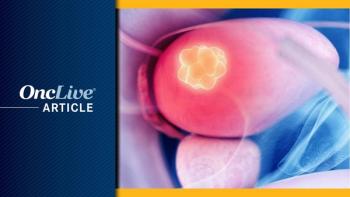
Dr. Friedlander on the FDA Approval of Enfortumab Vedotin Plus Pembrolizumab in Urothelial Cancer

Terence Friedlander, MD, discusses the significance of the FDA approval of frontline enfortumab vedotin combined with pembrolizumab in patients with urothelial carcinoma.
Terence Friedlander, MD, chief, Hematology-Oncology, associate director, Cancer Research, Zuckerberg San Francisco General, Helen Diller Family Comprehensive Cancer Center; associate clinical professor, Division of Hematology/Oncology, University of California San Francisco, discusses the significance of the FDA approval of frontline enfortumab vedotin-ejfv (Padcev) combined with pembrolizumab (Keytruda) in patients with urothelial carcinoma.
On April 3, 2023, the FDA approved the combination of enfortumab vedotin, an antibody-drug conjugate (ADC), and pembrolizumab, a PD-1 inhibitor, in patients with previously untreated locally advanced or metastatic urothelial cancer who are ineligible for cisplatin-containing chemotherapy. The regulatory decision was based on findings from the dose-escalation, A, and K cohorts of the phase 1b/2 KEYNOTE-869/EV-103 trial (NCT03288545). In the dose-escalation cohort and cohort A, patients received enfortumab vedotin plus pembrolizumab. In cohort K, patients were randomized 1:1 to receive enfortumab vedotin with or without pembrolizumab.
The primary end point of this trial was confirmed overall response rate (ORR) by blinded independent central review. Key secondary end points were duration of response (DOR), overall survival, and safety.
This approval represents a new treatment option in the frontline setting for urothelial cancer, Friedlander says. The data from EV-103 show that the combination of enfortumab vedotin and pembrolizumab is effective in patients with metastatic disease who are ineligible for cisplatin, Friedlander explains.
Although carboplatin-based regimens are the standard of care for cisplatin-ineligible patients with advanced urothelial cancer, these patients often do not respond to these chemotherapy regimens in the frontline setting, Friedlander notes. EV-103 demonstrated consistent efficacy with first-line enfortumab vedotin plus pembrolizumab, with ORRs of 64.5% in cohort K and 73.3% in cohort A, Friedlander says. Additionally, in cohort K, the median DOR with the combination was not reached vs 13.2 months with enfortumab vedotin alone.
Common adverse effects in patients who received enfortumab vedotin plus pembrolizumab were fatigue, alopecia, maculo-papular rash, and peripheral sensory neuropathy.
As patients in this group, which has traditionally had a poor prognosis with limited options, are responding to this ADC/immunotherapy combination, the approval of this regimen is a step forward in urothelial cancer treatment, Friedlander concludes.



































